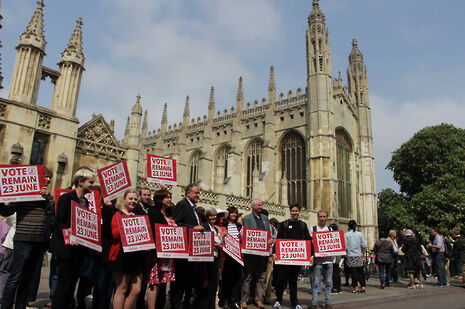CULC reacts to Corbyn’s victory
Joe Robinson and Olivia Barber report on the division in Cambridge Universities Labour Club over the national party’s future prospects

Over the last three months, the Labour leadership battle played out in a contest not wanting for controversy or conflict. In constituency meetings and town halls up and down the country, the conflict between beleaguered incumbent Jeremy Corbyn and soft-left challenger Owen Smith took shape in a clash, many thought, for the soul of the Labour Party itself.
After heated debates, accusations of entryism and supposed low skullduggery on the party’s National Executive Committee (NEC), Labour earlier this month crowned Corbyn leader for the second time in as many years. Though in spite of the scale of the victory and his ostensibly increased mandate, Corbyn’s re-election does little to resolve the fundamental disagreements over his competence and the party’s electoral prospects, which brought about the challenge in the first place. Calls for unity, for the time being, appear to be ringing somewhat hollow.
In the meantime, political life goes on: local parties continue to function and councils must continue to govern. For Cambridge Universities Labour Club (CULC), the task remains one of balancing its function as a forum of debate and discussion with its role as a campaigning force, both within the University and in the Cambridge constituency. Like the national party, its members remain sharply divided over not only the impact of Corbyn’s re-election but also the party’s prospects for power.
The changing complexion of Labour and its membership, which has grown to 640,000 and is projected to rise further, remains a challenge for the party, in terms of vetting its new members and translating its numerical advantage into campaigning muscle.
Olly Hudson, a Sidney Sussex finalist, observes that “[t]he Labour Party has clearly changed beyond all recognition over the last year,” though he notes that this is “not for the better”. Highlighting the problems posed by allegations of anti-Semitism within the party, he argued that “[i]f I wasn’t already a member I couldn’t see myself joining a party that tolerates anti-Semitism,” and goes on to state that the party “promotes such a toxic internal culture where members feel uncomfortable and even unsafe expressing their views.”
Even those who supported Corbyn’s candidacy express reservations concerning his performance. While conceding that she was “pleased with the result” because she thought Corbyn was the “better candidate of the two”, Beth Jamal, a Murray Edwards finalist, remarked that there is “great work to be done to improve his image and […] media strategy”. Though, she also stated that “the most important thing is that both sides move on from this and the infighting stops so we can form a strong opposition to the Tories.”
A number of CULC members expressed a sense of frustration at the fact a challenge to Corbyn’s leadership was mounted at all. Luke Heppenstall-West, a finalist at Queens’, called the veteran left-winger’s victory “bittersweet” but branded the leadership election “frankly excruciating and unneccessary”, adding that “Corbyn’s retention of power was never in doubt [and] MPs’ actions have only heightened tensions between Westminster and the grassroots.” He opines that despite “platitudes about a common ground”, there is a lot of anger, and “both sides need to accept that the status quo has changed drastically and radically introspect if they want to adapt to the new generation of mass party politics.”
Imogen Shaw, CULC Co-Chair, also criticised the need for a second leadership contest, calling it an “exercise in futility” and arguing that “Corbyn was always going to win, and Labour was always going to be left in precisely the same divided situation it was in before the contest was triggered, give or take a little more internal animosity.” She recommended that in order to unite the party “we need to advise members […] that they really don’t need to get involved in the ‘us vs them’ narrative that exists within the party at the moment... the only way we’re going to create a better [atmosphere] is by refusing to accept uncritical factionalism and pressurised slate voting as conditions of party membership.”
Some members are also critical of what the changing composition of Labour membership means for the party’s electability. Luke Warner, a finalist at King’s, contends that “[u]nfortunately I can see no way for the party to get into power for upwards of 10 years now,” arguing that the membership had “shifted and reaffirmed its willingness to focus on purity rather than engaging with voters on their own terms.” He added that despite the party’s apparent remoteness from power, “Corbynistas either don’t understand that or seem to care.”
Despite these warnings, some members expressed relief at Corbyn’s reelection. Annie Picton, a Murray Edwards student, stated that she was “relieved to maintain a genuinely strong left-wing opposition in light of the current move towards the right of the party in power,” adding that she believed Corbyn was “the right leader for the left and our society.” She then called for “all of the Labour Party to unite behind him, and recognise the actual fight needs to be against the actions of our government.”
If CULC’s internal divisions are anywhere near representative of the party at large, then both Labour’s aspirations for unity and its plans for government could come unstuck as long as Corbyn remains leader.
 Comment / Why shouldn’t we share our libraries with A-level students?25 June 2025
Comment / Why shouldn’t we share our libraries with A-level students?25 June 2025 News / Lord Mandelson visits University30 June 2025
News / Lord Mandelson visits University30 June 2025 Features / 3am in Cambridge25 June 2025
Features / 3am in Cambridge25 June 2025 Theatre / Twelfth Night almost achieves greatness26 June 2025
Theatre / Twelfth Night almost achieves greatness26 June 2025 Features / What it’s like to be an underage student at Cambridge29 June 2025
Features / What it’s like to be an underage student at Cambridge29 June 2025





